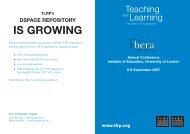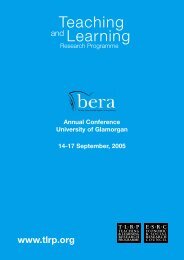Assessment in schools Fit for purpose? - Teaching and Learning ...
Assessment in schools Fit for purpose? - Teaching and Learning ...
Assessment in schools Fit for purpose? - Teaching and Learning ...
You also want an ePaper? Increase the reach of your titles
YUMPU automatically turns print PDFs into web optimized ePapers that Google loves.
<strong>Assessment</strong> <strong>in</strong> <strong>schools</strong>. <strong>Fit</strong> <strong>for</strong> <strong>purpose</strong>?<br />
This is deceptively simple. It is only <strong>in</strong> try<strong>in</strong>g to express these th<strong>in</strong>gs <strong>in</strong> discussion that most of us come<br />
to realise where our difficulties lie: there is wisdom <strong>in</strong> the familiar say<strong>in</strong>g, “How do I know what I th<strong>in</strong>k<br />
until I hear myself speak? ”. Likewise, we may need help to see <strong>and</strong> underst<strong>and</strong> our dest<strong>in</strong>ation with<br />
sufficient clarity that we can guide ourselves <strong>in</strong> the right direction. Both of these require that we are<br />
actively engaged <strong>in</strong> discussion, of our ideas <strong>and</strong> of our learn<strong>in</strong>g goals. Peer-discussion is essential to<br />
achiev<strong>in</strong>g such engagement.<br />
TLRP projects <strong>in</strong>vestigat<strong>in</strong>g how pupils can learn effectively <strong>in</strong> groups demonstrated that when teachers<br />
implement practical group-work strategies, based on the development of social skills, followed by<br />
communication skills, followed by problem-solv<strong>in</strong>g, significant ga<strong>in</strong>s can be made <strong>in</strong> atta<strong>in</strong>ment,<br />
motivation <strong>and</strong> behaviour. It is not just that, through group discussion, all pupils <strong>in</strong> a class can get<br />
<strong>in</strong>volved. There is also benefit <strong>in</strong> pupils see<strong>in</strong>g their own ideas reflected <strong>in</strong> the responses <strong>and</strong> challenges<br />
of their peers, <strong>and</strong> <strong>in</strong> learn<strong>in</strong>g from them about different ways of tackl<strong>in</strong>g the problems that are <strong>in</strong>trigu<strong>in</strong>g.<br />
Pupils benefit from do<strong>in</strong>g all of this <strong>in</strong> the language <strong>and</strong> style that they use with one another. Yet, as the<br />
group-work projects emphasised, the practice of constructive discussion <strong>in</strong> groups has to be taught.<br />
If pupils merely compete to prove who is right, or dismiss one another’s comments rather than tak<strong>in</strong>g<br />
them seriously, they are aga<strong>in</strong> be<strong>in</strong>g judgmental rather than <strong>for</strong>mative. Thus the ideal is that pupils<br />
engage <strong>in</strong> <strong>for</strong>mative assessment <strong>for</strong> one another.<br />
Sources:<br />
<strong>Assessment</strong> Re<strong>for</strong>m Group (1999) <strong>Assessment</strong> <strong>for</strong> learn<strong>in</strong>g: beyond the black box. Cambridge:<br />
University of Cambridge School of Education.<br />
<strong>Assessment</strong> Re<strong>for</strong>m Group (2002) <strong>Assessment</strong> <strong>for</strong> Learn<strong>in</strong>g: 10 Pr<strong>in</strong>ciples. Cambridge: University of<br />
Cambridge School of Education.<br />
Ba<strong>in</strong>es, E., Blatch<strong>for</strong>d, P., Kutnick, P., Chowne, A., Ota, C. & Berdond<strong>in</strong>i, L. (2008) Promot<strong>in</strong>g Effective<br />
Group Work <strong>in</strong> the Primary Classroom. A H<strong>and</strong>book <strong>for</strong> Teachers <strong>and</strong> Practitioners.<br />
Ab<strong>in</strong>gdon: Routledge.<br />
Black, P., Harrison, C., Lee, C., Marshall, B. & Wiliam, D. (2003) <strong>Assessment</strong> <strong>for</strong> learn<strong>in</strong>g: putt<strong>in</strong>g it <strong>in</strong>to<br />
practice. Maidenhead: Open University Press.<br />
Black, P., Harrison, C., Lee, C., Marshall, B. & Wiliam, D. (2002) Work<strong>in</strong>g <strong>in</strong>side the black box:<br />
assessment <strong>for</strong> learn<strong>in</strong>g <strong>in</strong> the classroom. London: K<strong>in</strong>g’s College London.<br />
Black, P., Harrison, C., Hodgen, J., Marshall, B. & Serret, N. (under review) Validity <strong>in</strong> teachers’<br />
summative assessments, <strong>Assessment</strong> <strong>in</strong> Education.<br />
Blatch<strong>for</strong>d, P., Galton, M., Kutnick, P., Ba<strong>in</strong>es, E., Berdond<strong>in</strong>i, L., Chowne, A., Hargreaves, L., Ota,<br />
C., Page, C., Pell, A., Smith, J. & Steward, S. (2005) Improv<strong>in</strong>g pupil group work <strong>in</strong> classrooms: A<br />
new approach to <strong>in</strong>creas<strong>in</strong>g engagement <strong>and</strong> learn<strong>in</strong>g <strong>in</strong> everyday classroom sett<strong>in</strong>gs at Key Stages<br />
1, 2 <strong>and</strong> 3. TLRP research brief<strong>in</strong>g 11. London: TLRP.<br />
Christie, D., Tolmie, A., Thurston, A., Howe, H. & Topp<strong>in</strong>g, K. (2009) Support<strong>in</strong>g group work <strong>in</strong> Scottish<br />
primary classrooms: improv<strong>in</strong>g the quality of collaborative dialogue. Cambridge Journal of Education<br />
- Special Issue on Group Work, 39(1): 141-156.<br />
Gardner, J, (Ed.) (2006) <strong>Assessment</strong> <strong>and</strong> Learn<strong>in</strong>g. London: Sage<br />
(an <strong>Assessment</strong> Re<strong>for</strong>m Group publication).<br />
James, M., Black, P., Carmichael, P., Conner, C., Dudley, P., Fox, A., Frost, D., Honour, L., MacBeath,<br />
J., McCormick, R., Marshall, B., Pedder, D., Procter, R., Swaffield, S. & Wiliam, D. (2006) Learn<strong>in</strong>g<br />
How to Learn: tools <strong>for</strong> <strong>schools</strong>. Ab<strong>in</strong>gdon: Routledge.<br />
James, M., McCormick, R., Black, P., Carmichael, P., Drummond, M-J., Fox, A., MacBeath, J.,<br />
Marshall, B., Pedder, D., Procter, R., Swaffield, S., Swann, J., & Wiliam, D. (2007) Improv<strong>in</strong>g<br />
Learn<strong>in</strong>g How to Learn - classrooms, <strong>schools</strong> <strong>and</strong> networks. Ab<strong>in</strong>gdon: Routledge.<br />
11

















